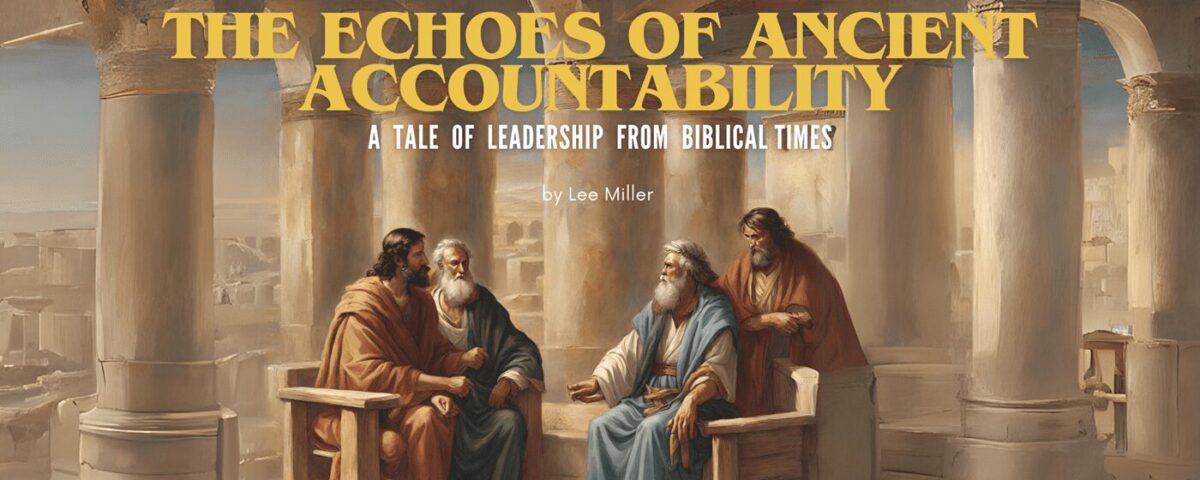By Lee Miller
In the land where history and heaven intersect, where prophets walked, and kings ruled under the watchful eyes of the Divine, there unfolds a tale of leadership—a saga steeped in the hallowed principle of accountability.
The Shepherd’s Charge: Moses and the Mantle of Responsibility
Once, amidst the ragged peaks of Sinai, a humble shepherd named Moses stood barefoot on holy ground. The voice from the burning bush was not just a call but a covenant of accountability. Moses, a man with stammering lips, was to challenge an empire and lead a nation to freedom. This was no trifling task, for with every step, every decree, every stretch of his shepherd’s staff, Moses was accountable—to God who sent him, to the people following him, and to the generations that would tell of him.
The parting of the Red Sea was not merely a miracle of deliverance but a testament to the power vested in accountable leadership. The waters stood as walls, witnesses to the integrity of a man who would rather face the wrath of Pharaoh than break faith with his God or his charges.
The Prophet’s Confrontation: Nathan and the Fall of a King
In the splendid halls of Jerusalem, where King David, the cherished and anointed sovereign, sat cloaked in power and luxury, a courageous voice ascended—a prophet named Nathan. He wove a story of a wealthy man taking from the poor, kindling the king’s rage, only to unveil that the oppressor in the narrative was David himself..
The confrontation was stark, the message clear: not even a king could escape the accountability of his station. In repentance, David found restoration, and in his fall, the Scriptures found a lesson etched for eternity—that authentic leadership is measured not by the scepter’s reach but by the heart’s capacity for accountability.
The Wisdom Keeper’s Insight: Solomon and the Proverbs of Prudence
In the corridors of time stands the figure of Solomon, a king of wisdom and wealth. His proverbs, etched in the annals of the sacred text, sang praises to accountability. “By justice, a king gives a country stability, but those greedy for bribes tear it down.” His words were not mere musings but divine reflections on the essence of leadership—a beacon for those who would sit in judgment or rule nations.
Solomon’s testament taught that the throne’s power was still a loan from heaven, to be accounted for when the shadows grow long and the candle flickers in the sanctum of one’s soul.
The Leader’s Blueprint: Paul and the Letters of Guidance
Journey with me to the candlelit chamber where the Apostle Paul, with ink-stained fingers, penned letters that would echo through the corridors of time. To his beloved protégé Timothy, he wrote of vigilance and virtue. His epistles were more than guidance; they were blueprints for accountable leadership in the fledgling church, where shepherds were to guard their flock with humility and hold themselves to the highest standard.
Paul’s life, a tapestry of trials for the gospel’s sake, demonstrated that the most valid form of leadership is found in service. The purest form of accountability is lived out in the light of truth and grace.
The Master’s Parable: Jesus and the Tale of Talents
In the waning light of an age long past, a Carpenter from Nazareth told a story that would traverse centuries. It was a simple tale of servants entrusted with their Master’s wealth, each held accountable for its use. When the Master returned, it was not the success but the faithfulness of the servants that he sought.
Here, in the simplicity of a parable, the Master taught the world that accountability is the sacred trust between the given task and its completion, between the gift and its use, and between the call and its response.
The Fulcrum of Eternity: The Servant King
In the culmination of this celestial narrative, Jesus Himself stood as the fulcrum of accountability. With every miracle, parable, and step towards Calvary, He bore the weight of a world in need. His crown was not of gold but of thorns, His throne a cross, where He would answer the call of redemption with His very life.
In His resurrection, the tale of accountability found its apex, for the Servant King rose not to claim victory for Himself but to offer it to those He came to save—a final act of leadership that redefined power and reestablished the foundations of accountable servitude.
The Living Echo: Our Call to Accountability
This truth of old beckons us, today’s leaders, to embrace the mantle of accountability worn by those who walked the sands of ancient lands. It calls us to remember that our decisions, actions, and intentions are threads in a larger tapestry, one that stretches beyond our brief span upon this earth.
And so, let us lead with a reverence for the past, a responsibility to the present, and a readiness for the future, understanding that the echo of our leadership will resound in the halls of eternity and the story we write is one we must ultimately recount before the Author of all.
In every decision’s wake, in every action’s ripple, in every intention’s shadow, we find the whispers of ancient accountability, reminding us that leadership, at its core, is a sacred trust—a story not of dominion, but of stewardship, not of power, but of service, not of self, but of others, and always, always, under the watchful gaze of the Divine.




